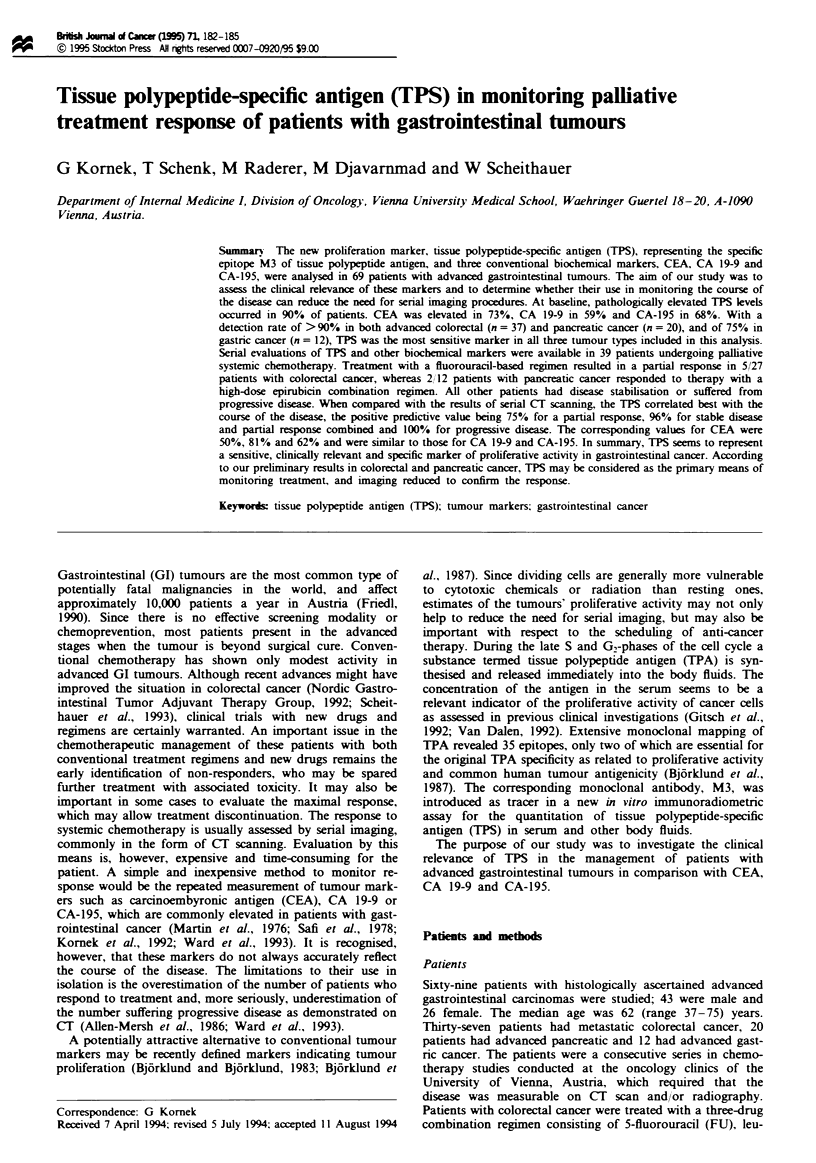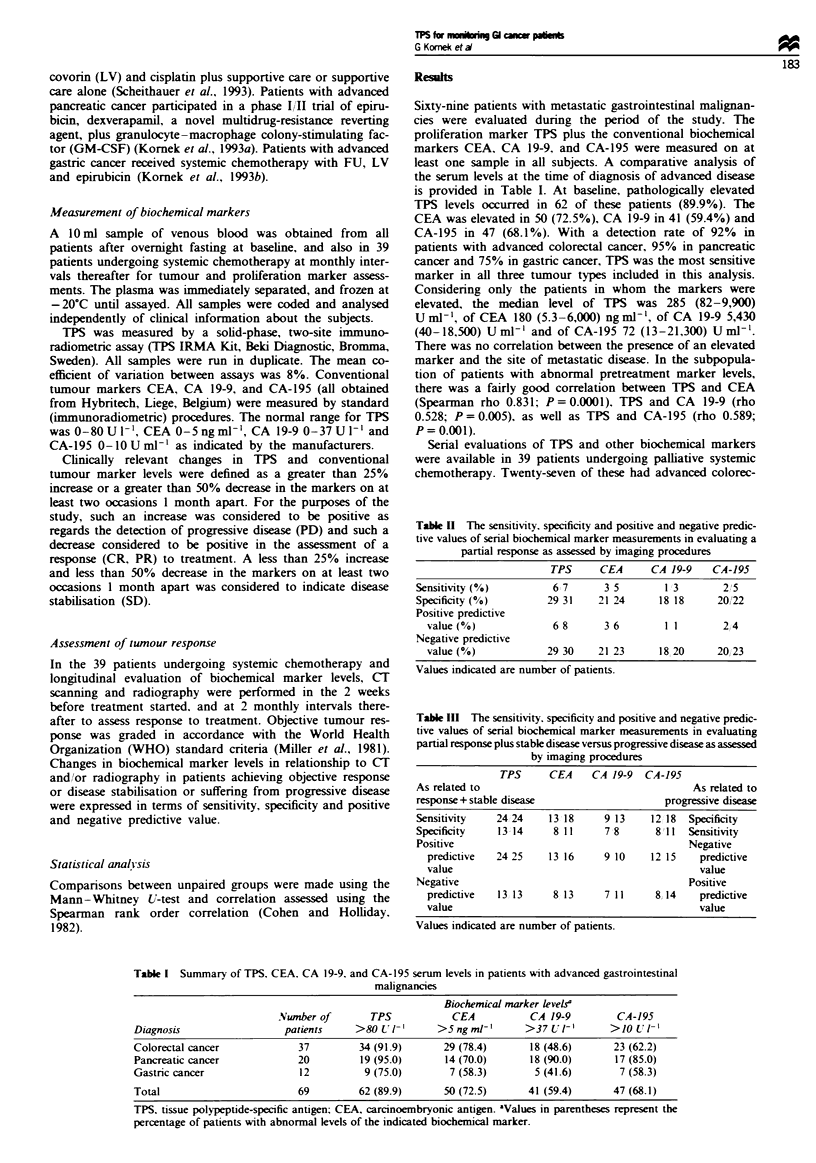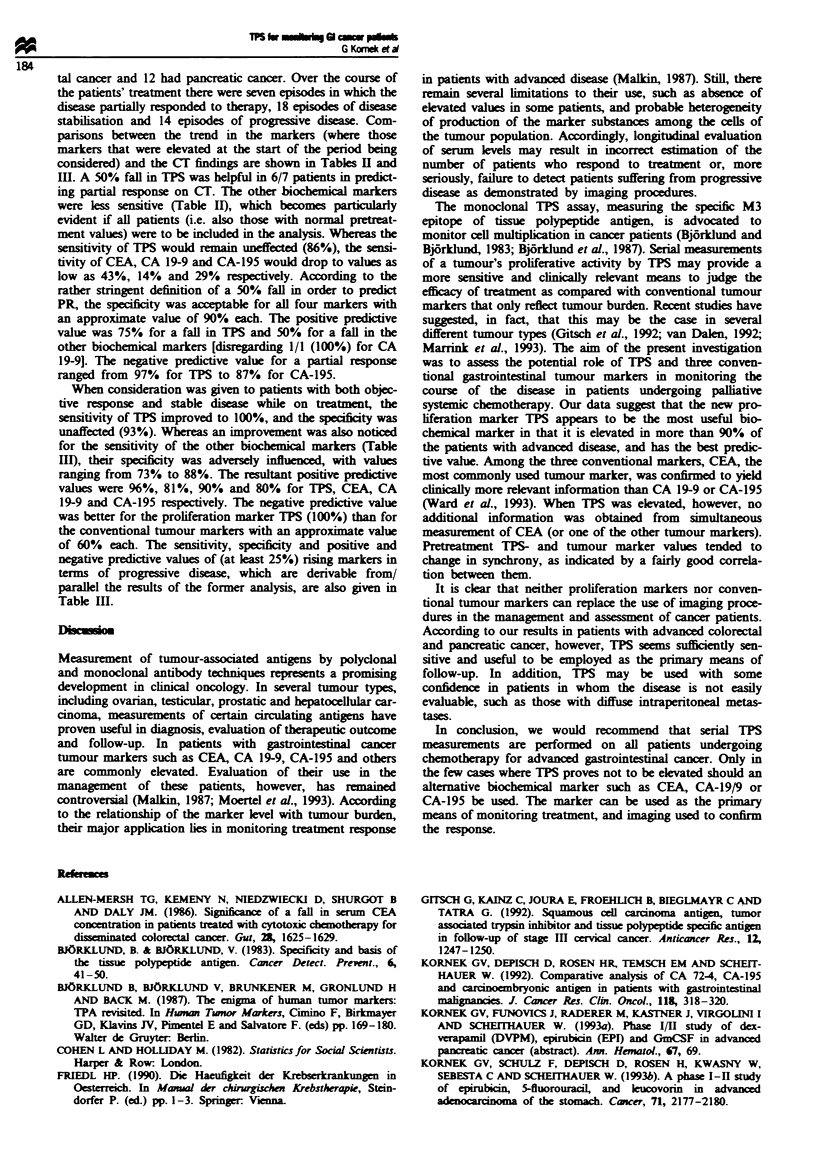Abstract
The new proliferation marker, tissue polypeptide-specific antigen (TPS), representing the specific epitope M3 of tissue polypeptide antigen, and three conventional biochemical markers, CEA, CA 19-9 and CA-195, were analysed in 69 patients with advanced gastrointestinal tumours. The aim of our study was to assess the clinical relevance of these markers and to determine whether their use in monitoring the course of the disease can reduce the need for serial imaging procedures. At baseline, pathologically elevated TPS levels occurred in 90% of patients. CEA was elevated in 73%, CA 19-9 in 59% and CA-195 in 68%. With a detection rate of > 90% in both advanced colorectal (n = 37) and pancreatic cancer (n = 20), and of 75% in gastric cancer (n = 12), TPS was the most sensitive marker in all three tumour types included in this analysis. Serial evaluations of TPS and other biochemical markers were available in 39 patients undergoing palliative systemic chemotherapy. Treatment with a fluorouracil-based regimen resulted in a partial response in 5/27 patients with colorectal cancer, whereas 2/12 patients with pancreatic cancer responded to therapy with a high-dose epirubicin combination regimen. All other patients had disease stabilisation or suffered from progressive disease. When compared with the results of serial CT scanning, the TPS correlated best with the course of the disease, the positive predictive value being 75% for a partial response, 96% for stable disease and partial response combined and 100% for progressive disease. The corresponding values for CEA were 50%, 81% and 62% and were similar to those for CA 19-9 and CA-195. In summary, TPS seems to represent a sensitive, clinically relevant and specific marker of proliferative activity in gastrointestinal cancer. According to our preliminary results in colorectal and pancreatic cancer, TPS may be considered as the primary means of monitoring treatment, and imaging reduced to confirm the response.
Full text
PDF



Selected References
These references are in PubMed. This may not be the complete list of references from this article.
- Björklund B., Björklund V. Specificity and basis of the tissue polypeptide antigen. Cancer Detect Prev. 1983;6(1-2):41–50. [PubMed] [Google Scholar]
- Gitsch G., Kainz C., Joura E., Fröhlich B., Bieglmayr C., Tatra G. Squamous cell carcinoma antigen, tumor associated trypsin inhibitor and tissue polypeptide specific antigen in follow up of stage III cervical cancer. Anticancer Res. 1992 Jul-Aug;12(4):1247–1249. [PubMed] [Google Scholar]
- Kornek G. V., Depisch D., Rosen H. R., Temsch E. M., Scheithauer W. Comparative analysis of CA72-4, CA195 and carcinoembryonic antigen in patients with gastrointestinal malignancies. J Cancer Res Clin Oncol. 1992;118(4):318–320. doi: 10.1007/BF01208623. [DOI] [PMC free article] [PubMed] [Google Scholar]
- Kornek G., Schulz F., Depisch D., Rosen H., Kwasny W., Sebesta C., Scheithauer W. A phase I-II study of epirubicin, 5-fluorouracil, and leucovorin in advanced adenocarcinoma of the stomach. Cancer. 1993 Apr 1;71(7):2177–2180. doi: 10.1002/1097-0142(19930401)71:7<2177::aid-cncr2820710702>3.0.co;2-q. [DOI] [PubMed] [Google Scholar]
- Marrink J., Oosterom R., Bonfrer H. M., Schröder F. H., Mensink H. J. Tissue polypeptide-specific antigen: a discriminative parameter between prostate cancer and benign prostatic hypertrophy. Eur J Cancer. 1993;29A(4):570–571. doi: 10.1016/s0959-8049(05)80153-4. [DOI] [PubMed] [Google Scholar]
- Martin E. W., Jr, Kibbey W. E., DiVecchia L., Anderson G., Catalano P., Minton J. P. Carcinoembryonic antigen: clinical and historical aspects. Cancer. 1976 Jan;37(1):62–81. doi: 10.1002/1097-0142(197601)37:1<62::aid-cncr2820370110>3.0.co;2-#. [DOI] [PubMed] [Google Scholar]
- Miller A. B., Hoogstraten B., Staquet M., Winkler A. Reporting results of cancer treatment. Cancer. 1981 Jan 1;47(1):207–214. doi: 10.1002/1097-0142(19810101)47:1<207::aid-cncr2820470134>3.0.co;2-6. [DOI] [PubMed] [Google Scholar]
- Moertel C. G., Fleming T. R., Macdonald J. S., Haller D. G., Laurie J. A., Tangen C. An evaluation of the carcinoembryonic antigen (CEA) test for monitoring patients with resected colon cancer. JAMA. 1993 Aug 25;270(8):943–947. [PubMed] [Google Scholar]
- Safi F., Bittner R., Roscher R., Kübel R., Beger H. G. The value of CA 19-9 in gastric and colorectal carcinoma. Cancer Invest. 1987;5(5):401–407. doi: 10.3109/07357908709032897. [DOI] [PubMed] [Google Scholar]
- Scheithauer W., Rosen H., Kornek G. V., Sebesta C., Depisch D. Randomised comparison of combination chemotherapy plus supportive care with supportive care alone in patients with metastatic colorectal cancer. BMJ. 1993 Mar 20;306(6880):752–755. doi: 10.1136/bmj.306.6880.752. [DOI] [PMC free article] [PubMed] [Google Scholar]
- Ward U., Primrose J. N., Finan P. J., Perren T. J., Selby P., Purves D. A., Cooper E. H. The use of tumour markers CEA, CA-195 and CA-242 in evaluating the response to chemotherapy in patients with advanced colorectal cancer. Br J Cancer. 1993 May;67(5):1132–1135. doi: 10.1038/bjc.1993.208. [DOI] [PMC free article] [PubMed] [Google Scholar]
- van Dalen A. TPS in breast cancer--a comparative study with carcinoembryonic antigen and CA 15-3. Tumour Biol. 1992;13(1-2):10–17. doi: 10.1159/000217747. [DOI] [PubMed] [Google Scholar]



